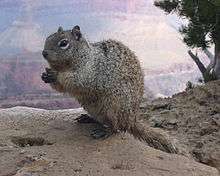Namdapha flying squirrel
| Namdapha flying squirrel | |
|---|---|
| Scientific classification | |
| Kingdom: | Animalia |
| Phylum: | Chordata |
| Class: | Mammalia |
| Order: | Rodentia |
| Family: | Sciuridae |
| Subfamily: | Sciurinae |
| Tribe: | Pteromyini |
| Genus: | Biswamoyopterus Saha, 1981 |
| Species: | B. biswasi |
| Binomial name | |
| Biswamoyopterus biswasi Saha, 1981[2] | |
The Namdapha flying squirrel (Biswamoyopterus biswasi) is an arboreal, nocturnal flying squirrel endemic to northeastern India, where it is known from a single specimen collected in Namdapha National Park in 1981.[1] It was the sole member in the genus Biswamoyopterus until the description of the Laotian giant flying squirrel (Biswamoyopterus laoensis) in 2013.[3] No population estimates are available for B. biswasi, but the known habitat is tall Mesua ferrea jungles, often on hill slopes in the catchment area of Na Dihing river (particularly on the western slope of Patkai range) in North eastern India.[4][5]
Description
B. biswasi has reddish, grizzled fur with white above. Its crown is pale grey, its patagium is orangish and its underparts are white.[4][5]
The cheek teeth of B. biswasi are simple, and its incisors are unpigmented. Septae are multiple in auditory bullae and sometimes honeycomb-shaped with 10 to 12 cells in it.[4][5]
It measures 40.5 cm from head to vent and has 60 cm long tail. The hindfoot is 7.8 cm and the ear is 4.6 cm.[4][5]
The scientific name commemorates Biswamoy Biswas (1923–1994).
Status
This species is listed as "critically endangered. It is known from a single specimen collected in 1981 from the Namdapha National Park, though there were informal sightings in 2002. Its range may be restricted to a single valley and it is threatened by poaching of animals for food from within the park, and possibly by habitat destruction.[1] The Namdapha Flying Squirrel is among the 25 “most wanted lost” species that are the focus of Global Wildlife Conservation’s “Search for Lost Species” initiative.[6]
References
- 1 2 3 Molur, S. (2008). "Biswamoyopterus biswasi". IUCN Red List of Threatened Species. Version 2008. International Union for Conservation of Nature. Retrieved 6 January 2009.
- ↑ Reference for taxonomic information from Don E. Wilson; DeeAnn M. Reeder, eds. (2005). Mammal Species of the World - A Taxonomic and Geographic Reference (3rd ed.).
- ↑ Sanamxay, Daosavanh; Douangboubpha, Bounsavane; Bumrungsri, Sara; Xayavong, Sysouphanh; Xayaphet, Vilakhan; Satasook, Chutamas; Bates, Paul J.J. (2013). "Rediscovery of Biswamoyopterus (Mammalia: Rodentia: Sciuridae: Pteromyini) in Asia, with the description of a new species from Lao PDR". Zootaxa. Magnolia Press. 3686 (4): 471–481. doi:10.11646/zootaxa.3686.4.5. ISSN 1175-5334.
- 1 2 3 4 Saha, S. S. (1981). "A new Genus and a new species of flying squirrel (Mammalia: Rodentia: Sciuridae) from northeastern India". Bull. Zool. Surv. India. 4 (3): 331–336.
- 1 2 3 4 Saha, S. S. (1985). "Arunachal Pradesh: A Proposed Biosphere Reserve". Mammalia Rec. Zool. surv. India (Special Issue on Fauna of Namdapha. 82 (1–4): 321–330.
- ↑ "The Search for Lost Species". Global Wildlife Conservation. Retrieved 10 July 2017.
| Wikimedia Commons has media related to Biswamoyopterus. |



.jpg)